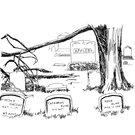Legislators: Don’t leave Guilderland residents, enforcers, and zoning board members up in the air on short-term rentals
An interplay between courts and legislatures is essential to carry out the will of the people.
We wrote those words on this page last year, after talking to historian Bruce Dearstyne, as we traced our state’s history of our legislature enacting laws after court decisions made the need clear.
Dearstyne had just published a book that chronicled the essential interaction between the judicial and legislative branches of government. A democracy cannot function without that balance.
One of the many cases showing this interplay, Roberson Vs. Rochester Folding Box Company, involved a 17-year-old Rochester woman, Abigail Roberson, who was stunned to the point of a nervous collapse — sending her to bed under a doctor’s care — after a studio portrait of her showed up on advertising posters without her permission.
This was soon after cameras became widely available and there were public concerns about privacy.
The first two courts in New York’s three-tiered system ruled in favor of Roberson. Then, in 1902, the Court of Appeals, in a close 4-to-3 ruling, reversed the lower courts’ decisions.
Summarizing the case, the chief judge, Alton B. Parker, soon to be defeated in his run for the presidency, wrote, “Such publicity, which some find agreeable, is to plaintiff very distasteful, and thus, because of defendants’ impertinence in using her picture without her consent for their own business purposes, she has been caused to suffer mental distress where others would have appreciated the compliment to their beauty implied in the selection of the picture for such purposes ….”
“The so-called ‘right of privacy’ has not as yet found an abiding place in our jurisprudence,” wrote Parker, for the majority. He feared a flood of litigation.
What followed was a flood of criticism from the public and the press — and a call for legislation that the state’s top court had said was lacking.
The New York State Legislature acted and passed the nation’s first privacy law in 1903. When that law was later challenged in court, “The court ruled that’s fine. It’s the law. We approve it. No problem, ” said Dearstyne.
Other states soon followed suit. That law is still on the books in New York State.
The balance that is necessary at the state level, and the federal level, too, is also essential at the local level.
Last month, the quasi-judicial zoning board in Guilderland issued an interpretation that clearly needs a legislative reaction.
Just as widespread use of cameras was new in the early 1900s, short-term rentals booked online, like Airbnb, are new to our generation.
Jason Beckmann, who grew up in Guilderland and now lives in Colorado, told the zoning board, over the phone from Colorado, that he had bought the house at 4218 Becker Road to stay in when he visits home and rented it out for a year, through Airbnb, to others who wanted to stay in town.
The building inspector found Beckmann was in violation of town code.
The case made to the zoning board by Beckmann’s lawyer, Jesse Sommer, covered in a front-page story last week by our reporter Sean Mulkerrin, was that nothing in the state law or town code specifically addresses short-term rentals like Airbnbs.
Guilderland’s code specifically defines inns, bed-and-breakfasts, hotels, and motels.
“I agree with you that we should probably have a law for this but in the absence then it is just simply an interpretation by the zoning board, right?” the zoning board’s chairwoman, Elizabeth Lott, asked Sommer.
“There’s no path to compliance for Mr. Beckmann,” said Sommer. If he wanted to have an inn, he could apply for a special-use permit as the code outlines. If he wanted a bed-and-breakfast, he could apply for site-plan approval.
The new category of short-term rentals booked online is not specifically addressed in the Guilderland code and it needs to be.
Beckmann said, when he bought his Becker Road house, he saw nothing in the town code precluding it. His father, Gerd Beckmann, said he called on former Councilwoman Laurel Bohl as a “champion” to ask about it.
Supervisor Peter Barber responded to Bohl’s query with an email that was read at the November hearing.
“I’m not aware of any prohibition or regulations regarding short-term rentals. I personally know several residents who rent out their houses when they’re away for the winter,” wrote Barber. “I’m also aware that Afghan refugees are now living in two short-term situations in single-family homes, and I understand that the state is looking to do the same for Ukrainians.”
“Based on the strength of that and seeing nothing else, my son and his wife went forward and purchased a second home,” Gerd Beckmann told the board.
The only other person to speak at the hearing was Stephaine Deso who lives directly across the street from 4218 Becker Road.
She had been concerned about an Airbnb across the street and, as she worked for the town at the time, Deso said, “I spoke to the building department about rules and regulations and was told kind of a similar thing of not approved, not denied, kind of a gray area since it’s a new thing.”
Deso went on to say that she was “pleasantly surprised” and had “no complaints” about the Airbnb on her “quiet street.” She said, “They’ve made decent cosmetic improvements.”
Deso advocated for just what is needed. “I would appreciate having something more in the regulation about it for future use of Airbnbs or if my street suddenly turns into all of them and I’m the last one left,” she said.
This is a legitimate concern, especially in tourist towns. Sommer cited laws adopted by an Adirondack town, North Elba, and the village Lake Placid, as well as New York City — all popular tourist destinations.
We know people who live in Stowe, Vermont and Boothbay Harbor, Maine who say that short-term rentals, which boomed during the pandemic, have reduced the quality of life in their towns with many long-time residents moving to more affordable housing.
Since New York City adopted its new regulations, short-term listings have fallen by 77 percent, according to a recent New York Times article on the Airbnb phenomenon. It goes on to report that some had thought regulatory changes would be “Airbnb’s death knell,” but last week, the company posted better-than-expected third quarter results. According to the company, it added nearly 1 million active listings this year, and in the first half of 2023, Airbnb guests stayed in over 94,000 cities and towns — a record, the company said.
Of course, despite its recent push to attract tourists with its breweries and wineries, Guilderland does not have the draw of New York City or long-established tourist towns like Lake Placid, Stowe, or Boothbay.
And allowing short-term rentals in certain zones and at certain densities may turn out to be a boon to local businesses.
This, of course, would be for our legislators, the members of the Guilderland Town Board, to decide.
And the time is ripe to take up the topic as the town is in the midst of updating its comprehensive plan from which revised zoning is sure to follow.
Even the zoning board members themselves — who ultimately, by a vote of 3 to 1, upheld the building inspector’s decision — called for legislation.
Chairwoman Lott, before reading the resolution, said, “I think we are all, of course, town residents, and we would probably like the board, the town board, to consider writing a code.”
Zoning board member Sharon Cupoli who, like Lott, voted in favor of the resolution, said, “Short of changing our zoning code and town law, I’m in favor of your decision.”
Only member Kevin McDonald dissented. “Due to the vast amount of gray area here and that Airbnbs are kind of new to the scene, I’m not in favor,” he said. “And I would like to make a recommendation to our town board to work on regulations regarding Airbnb.”
Turning the gray area into the black and white of law would be better for everyone in town. People like Jason Beckmann wouldn’t be left in the lurch, purchasing a property that he can no longer use as intended.
Residents like Deso would haven’t to worry about her street being taken over by outsiders.
The zoning officer would have clear guidance on what is and is not allowed. Currently, citations of violations appear to be based only on complaints, which, in itself, is unfair.
Once rules are in place, enforcement should not be difficult because the business of short-term rentals depends on internet advertising — there are current listings on Airbnb for Guilderland — so violators would be easy to find.
And the zoning board members, who have the tough job of interpreting law, would have a clear guide. As in the case of Abigail Roberson, which spurred New York’s privacy laws, we urge that Jason Beckmann’s violation spur code in Guilderland for short-term rentals.
Having a law made the job of state courts easier just as it will make the job of the local zoning board easier. As Chairwoman Lott said in the midst of the November hearing, “When there is something in the code, that makes our job easier, doesn’t it?”


